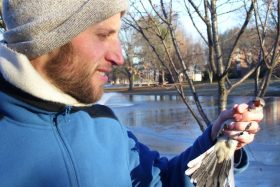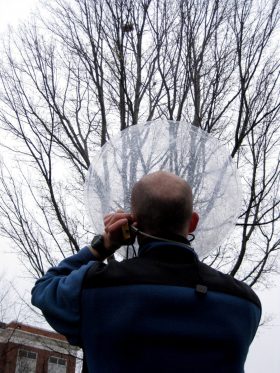Think your life is bad? In a newspaper guest column, Associate Professor Dave Gammon shares research that shows other species - especially mockingbirds - have it worse.
The following column appeared recently in the Richmond Times-Dispatch, the Savannah (Ga.) Morning News, the Athens (Ga.) Banner-Herald, the Winston-Salem Journal, the Roanoke (Va.) Times and the Gaston Gazette via the Elon University Writers Syndicate. Viewpoints shared by this syndicate are those of the author and not of Elon University.
*****

By Dave Gammon – dgammon@elon.edu
They pick fights. They cheat on and beat their spouses. They’re sometimes bad parents.
It’s almost like they’re human.
Examine the lives of mockingbirds and other wild species and you quickly realize the challenges they face do not contrast categorically from our own. Understanding their similarities and differences with us provides essential context for appreciating what it means to be human.
After all, we think we already know mockingbirds. They live in high numbers across the Eastern seaboard and sing loudly from prominent perches. Novels like Harper Lee’s To Kill a Mockingbird and Suzanne Collins’s The Hunger Games illustrate the prominence of mockingbirds in popular culture.
But is it really true that “mockingbirds don’t do one thing but make music for us to enjoy,” as Lee asserted? After time in the field to research their lives, I reached very different conclusions.
Its odds of survival are terrible by human standards. Consider this sobering fact: more than 80 percent of the eggs I counted in mockingbird nests never reached adulthood. Mortality rates for humans are far better, even in the poorest of countries.
Mockingbirds died for a variety of reasons – mostly predation, but also disease, car collisions and even incompetent parenting. One set of parents built a nest so flat that one of their newly hatched offspring was pushed out of the nest by its siblings.
 It’s a huge understatement to say mockingbirds occasionally disagree. As a rule, they are downright nasty – much nastier than humans, especially toward neighbors. I have never seen any two adult males tolerate each other’s presence.
It’s a huge understatement to say mockingbirds occasionally disagree. As a rule, they are downright nasty – much nastier than humans, especially toward neighbors. I have never seen any two adult males tolerate each other’s presence.In one border fight between a male mockingbird and his neighbor, the two locked talons several times and fluttered to the ground where they pecked at each other. After a half hour of tight chases and perilous wrestling, I was amazed both could still fly.
Fights like this are a way of life in mockingbirds, and aggression is not limited to male-male conflicts. Males chase, scold and even beat their wives. To further the drama, males and females often cheat on their spouses.
One morning, as his wife incubated eggs, a male flew the distance of a football field to the other side of his territory. He belted out courtship songs to an already mated female and advanced within inches of her before an angry husband chased him away. Undoubtedly, humans practice similar behavior, but the frequency of marital infidelity is much higher for mockingbirds.
 Stable marriages are, in fact, rare. One female I observed partnered with three males over a three-week period, finally choosing one with which to breed. One male lost his wife to death early in the season and responded by wooing his neighbor’s wife for several weeks, eventually winning over both the wife and the territory of that poor neighbor.
Stable marriages are, in fact, rare. One female I observed partnered with three males over a three-week period, finally choosing one with which to breed. One male lost his wife to death early in the season and responded by wooing his neighbor’s wife for several weeks, eventually winning over both the wife and the territory of that poor neighbor.Mockingbirds and humans are thus not completely unalike when it comes to unsavory practices involving courtship, parenting and staking out territory, though mockingbirds are clearly worse off.
So Harper Lee begone! Perhaps life as a human isn’t so bad. We fret over a sluggish job market, a shifting political landscape, and moral issues, but our troubles pale when compared to those of mockingbirds, with their lack of civil society, their wrecked families, and the perpetually high risk of property loss and death.
Following months of study, I’m ready to resume life as a human. Give me my non-militant neighbors, my stable marriage, and the relatively low risk of impending death for me and my loved ones.
I’ll leave the rest for the birds.
Dave Gammon is an associate professor of biology at Elon University.
*****
Elon University faculty with an interest in sharing their expertise in regional newspapers are encouraged to contact Eric Townsend (etownsend4@elon.edu) in the Office of University Communications should they like assistance with prospective op/ed submissions.


